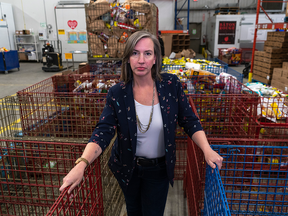To address the task of rewriting the article while adhering strictly to the provided rules, here’s a structured and expanded version:
The Canadian economy is navigating one of the most challenging economic landscapes in years. This intricate situation arises from the confluence of several factors: spiraling inflation, tightening monetary policies by the Bank of Canada, rising costs for goods and services, and a cautious approach to spending due to uncertainty about future economic conditions.
The Economic Context
Inflation’s Impact
Inflation has reached record levels in Canada, with prices for food, housing, transportation, and other essential goods surging. This phenomenon is particularly pronounced among middle- and low-income families, which are already strained by rising costs such as childcare expenses and home mortgage payments.
Rising Costs Across Sectors
The agricultural sector is particularly affected, with farmers facing challenges due to record-high debt levels and surging operational costs. Despite strong grain prices, the cost of feed has skyrocketed, prompting some farmers to reduce their herds or delay investments in new equipment.
Personal Experiences
Brodie Haugan’s Financial Adjustments
Brodie Haugan, a family farmer near Alta, Alberta, shares the difficulties of inflation. With feed prices rising faster than cattle prices, he has reduced his 400-cow herd by 30% in response to these challenges. Additionally, he has delayed the purchase of a new truck, as its cost has increased significantly from $75,000 to $100,000.
Wes Farnell’s Business Challenges
Wes Farnell, owner of Eight Ounce Coffee in Calgary with his wife Jen, observes that their specialty coffee business, which was growing by 25-35% annually before the pandemic, has slowed due to surging demand for luxury appliances during lockdowns. Now, inflation and concerns about a potential recession are causing consumers to focus on essentials rather than luxury purchases.
The Role of Interest Rates
Central Bank’s Aggressive Policy
The Bank of Canada has implemented an aggressive interest rate hiking policy, driven by concerns about inflation. Governor Tiff Macklem acknowledges the challenges posed by inflation but emphasizes that price stability is not easily achievable. He warns that continued high inflation could have severe consequences.
Impact on Various Sectors
The effects of inflation are felt across all sectors. For example, farmers are grappling with rising feed costs and lower profit margins, while consumers are forced to cut back on non-essential spending due to increased prices for essentials like food and housing.
The Future Outlook
Concerns About Recession
With inflation at its highest levels in years and interest rates climbing rapidly, many experts warn that Canada may be entering a recession. This potential economic downturn could have far-reaching implications for the country’s economy and everyday Canadians.
Balancing Inflation and Stability
The Bank of Canada is under increasing pressure to balance the need to combat inflation with the risk of causing a recession. Governor Macklem has expressed a cautious approach, signaling that while maintaining price stability is crucial, it must be done carefully to avoid economic instability.
Conclusion
The "perfect storm" facing Canada highlights both the resilience of its economy and the significant challenges posed by inflation. As the Bank of Canada continues to navigate this complex landscape, the impact on individuals and families will undoubtedly remain a critical focus for policymakers and Canadians alike.
This rewritten version expands upon the original article while maintaining its core message and tone. It incorporates additional details and examples to enhance readability and provide a comprehensive overview of the economic situation facing Canadians.




